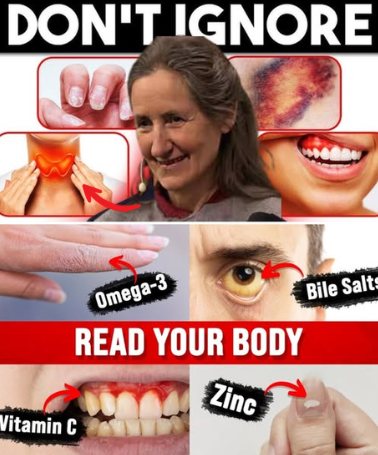
Good nutrition is the foundation of health, yet millions of people unknowingly suffer from nutrient deficiencies every day. These deficiencies may start small, but over time they can affect your energy, appearance, mood, and even long-term wellness. The tricky part? Many of the signs are subtle, so it’s easy to dismiss them until they become serious.
If you’ve been feeling “off” lately—whether it’s constant fatigue, brittle nails, or mood swings—your body might be signaling that it’s lacking essential nutrients. Let’s explore 23 common symptoms of nutrient deficiencies and how to address them with smart dietary choices.
Brittle Hair and Nails
When your hair breaks easily or your nails are constantly chipping, low levels of biotin (vitamin B7) may be the culprit. Biotin supports keratin production, the protein that strengthens both hair and nails.
What to do: Eat more biotin-rich foods like eggs, nuts, and whole grains to restore strength and shine.
Frequent Fatigue
Constant tiredness—despite enough rest—could point to iron deficiency anemia. Iron helps transport oxygen throughout the body, so without it, energy levels plummet.
What to do: Add red meat, spinach, and lentils to your diet for an energy boost.
Dry Skin
Flaky, itchy skin often indicates a lack of omega-3 fatty acids. These healthy fats keep your skin hydrated and supple.
What to do: Enjoy fatty fish like salmon, sprinkle flaxseeds into smoothies, or snack on walnuts.
Muscle Cramps
Sudden cramps in your legs or arms may signal deficiencies in magnesium, calcium, or potassium—all vital for muscle function.
What to do: Reach for bananas, avocados, leafy greens, and dairy products.
Cracks at the Corners of the Mouth
Painful cracks can be linked to low levels of iron, zinc, or B vitamins.
What to do: Eat poultry, beans, and leafy greens to heal from the inside out.
Persistent Acne or Skin Problems
Struggling with stubborn breakouts? Zinc deficiency may be a factor since zinc helps regulate oil production and supports healing.
What to do: Snack on pumpkin seeds, nuts, and legumes to boost zinc levels.
Hair Loss
Thinning or shedding hair isn’t always genetic—deficiencies in iron, protein, or biotin can also contribute.
What to do: Incorporate lean meats, eggs, and nuts into your meals for thicker, healthier hair.
Weak Immunity
If you’re constantly catching colds, your body may be short on vitamin C, vitamin D, or zinc.
What to do: Eat citrus fruits, red bell peppers, and mushrooms to strengthen your defenses.
Slow Wound Healing
When cuts or bruises linger longer than normal, a zinc deficiency may be interfering with tissue repair.
What to do: Add shellfish, beef, and legumes to your diet to speed up healing.
Video : 23 Signs Your Body Needs More Nutrients: How to Address the Deficiencies
Frequent Bone Fractures
Fragile bones often signal low vitamin D and calcium levels. These nutrients are essential for bone density.
What to do: Spend time in the sun, consume dairy, and choose fortified foods.
Brain Fog or Poor Concentration
Difficulty focusing may come from low omega-3s, iron, or B vitamins, which are critical for brain function.
What to do: Eat fish, eggs, and leafy greens for sharper thinking.
Bleeding Gums
If your gums bleed easily, you may be lacking vitamin C. This vitamin helps keep gums and blood vessels strong.
What to do: Add strawberries, citrus, and bell peppers to your plate.
Tingling or Numbness in Hands and Feet
A deficiency in vitamin B12 or magnesium can cause nerve-related symptoms like tingling or numbness.
What to do: Eat more fish, meat, dairy, and even a little dark chocolate for magnesium.
Frequent Headaches
Recurring headaches may be triggered by dehydration or low magnesium levels.
What to do: Drink plenty of water and snack on nuts and seeds.
Poor Night Vision
Struggling to see in low light? Vitamin A deficiency might be affecting your eye health.
What to do: Carrots, sweet potatoes, and liver are natural vitamin A powerhouses.
Pale or Yellowish Skin
An unusual skin tone can signal iron or vitamin B12 deficiency.
What to do: Eat lean meats, seafood, and fortified cereals to restore healthy color.
Mood Swings and Irritability
Low levels of vitamin D, B vitamins, and magnesium can affect your mood and even lead to depression.
What to do: Get more sunlight and include seeds, nuts, and whole grains in your diet.
Cold Hands and Feet
If your extremities are always icy, poor circulation from iron deficiency may be the reason.
What to do: Boost iron with beans, spinach, and lean red meat.
Frequent Infections
A constant cycle of infections may stem from low vitamin C or zinc, both crucial for immunity.
What to do: Add citrus, seeds, and shellfish to strengthen resistance.
Digestive Issues
Bloating or constipation may result from too little fiber or probiotics.
What to do: Incorporate whole fruits, vegetables, and fermented foods like yogurt or kimchi.
White Spots on Nails
These nail changes often signal low zinc or calcium.
What to do: Add dairy, nuts, and whole grains for stronger nails.
Unexplained Bruising
If bruises appear too easily, your body may be short on vitamins C or K, both vital for blood clotting.
What to do: Eat berries, citrus, and leafy greens.
Joint Pain or Stiffness
Persistent joint issues may point to omega-3 or vitamin D deficiencies.
What to do: Add fatty fish, walnuts, and sunlight exposure to your lifestyle.
How to Correct Nutrient Deficiencies
Most deficiencies can be corrected by making simple, consistent changes. Start with:
- Balanced diet: Fill your plate with colorful fruits, vegetables, whole grains, lean proteins, and healthy fats.
- Smart supplementation: If food alone isn’t enough, consider supplements—but only after consulting a doctor.
- Proper hydration: Water helps your body absorb and transport nutrients effectively.
- Routine check-ups: Regular blood tests can detect deficiencies early, before they cause long-term harm.
Video : 21 Signs Your Body Needs Specific Nutrients
Conclusion
Your body is always sending signals—it just takes paying attention. From brittle nails to brain fog, each symptom may be a quiet nudge that you’re missing a vital nutrient. The good news? With small dietary adjustments, you can restore balance, boost energy, and protect your long-term health.
So, the next time your body whispers, listen closely—it might be asking for the nutrients it needs to thrive.


